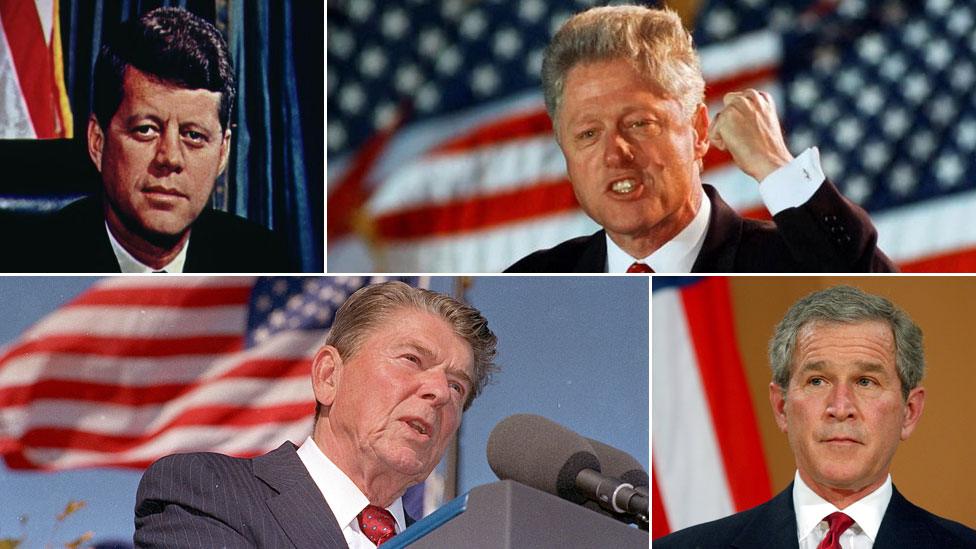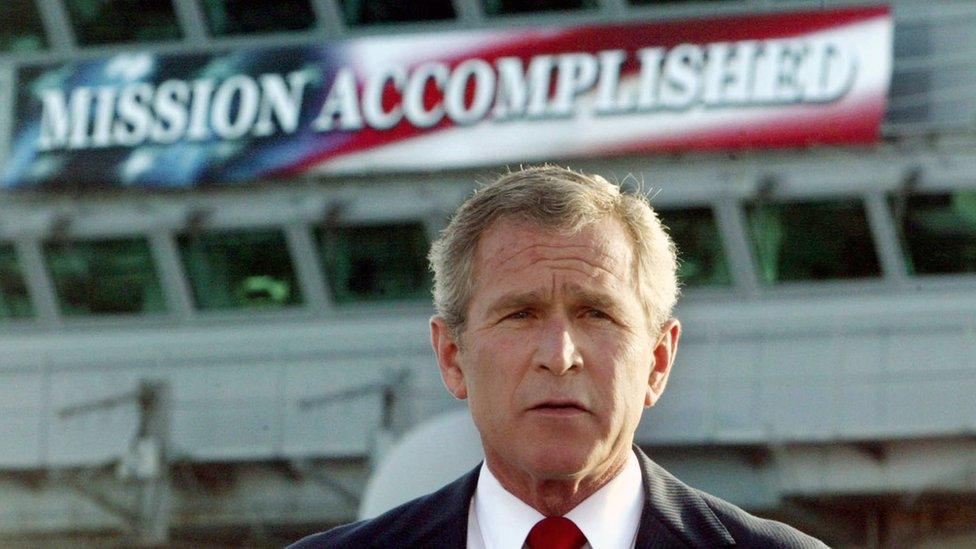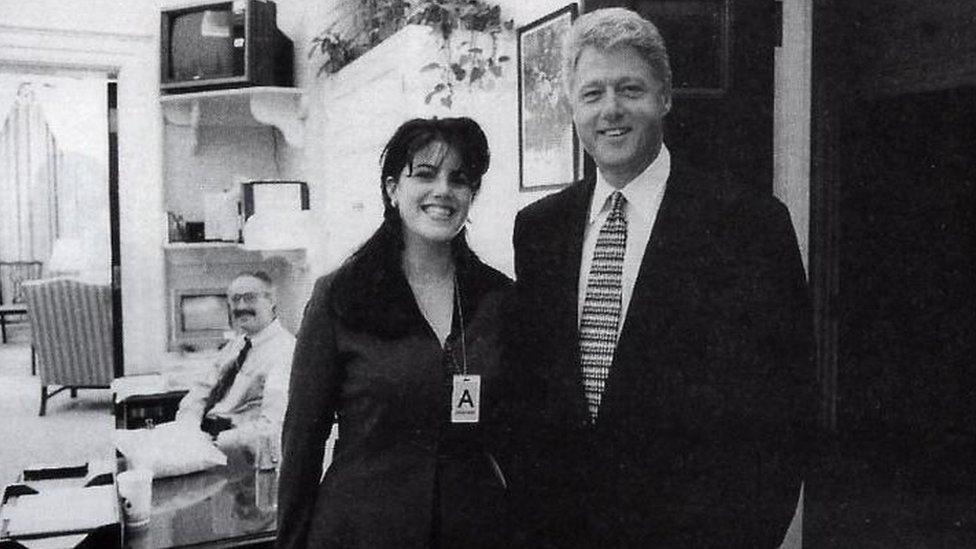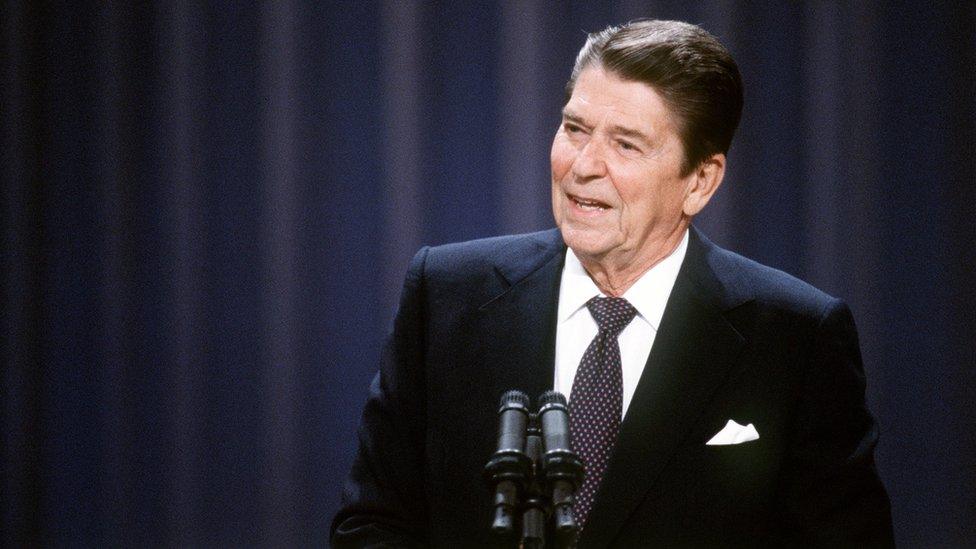Obama, Libya and all the presidents' regrets
- Published

Clockwise from left: John F Kennedy, Bill Clinton, George W Bush, Ronald Reagan
It is not often a president says they got something wrong but at the weekend Barack Obama did just that.
Asked for his worst mistake while in office, Mr Obama named the failure to plan for the aftermath of Col Gaddafi's ousting as Libyan leader, which sparked years of instability that are only just showing signs of easing.
Whether it be pride, a reluctance to show weakness or not wanting to hand opponents ammunition, such admissions do not come easily.
They tend to come out of political necessity, when a president's term is coming to an end or, safer still, when they are out of office altogether.
Even this apparent display of humility from Mr Obama, given as he considered his legacy, was qualified by his belief the intervention was "the right thing to do".

WMD

Mr Bush famously declared "mission accomplished" just weeks after the invasion of Iraq
Mr Obama's predecessor George W Bush said his biggest regret was the failure of intelligence over Iraqi weapons.
Mr Bush's administration built the case for the 2003 war on allegations, later discredited, that the Iraqi government had still possessed weapons of mass destruction.
But in the 2008 interview he would not say whether he would have decided to invade Iraq if he had known it had no weapons of mass destruction.
And he added: "I will leave the presidency with my head held high."

'That woman'

Bill Clinton was under great political pressure when he admitted his relationship with former White House intern Monica Lewinsky
Since leaving office, Bill Clinton has said he feels a "lifetime responsibility" over the Rwandan genocide, which happened during his first term.
On the 1994 bill that aimed at reducing crime by toughening sentences, but is now blamed for the disproportionate number of black and Hispanic people in jail, Mr Clinton said it had "made the problem worse".
His most famous admission however came while still president in 1998, following months of denials that he had had an affair with former White House intern Monica Lewinsky.
Amid the threat of impeachment, he owned up for the first time, saying: "I misled people, including my wife. I deeply regret that."

'Read my lips'
It was something George Bush Senior did before taking office that he came to rue the most.
Campaigning in 1988, he made the bold promise: "Read my lips: no new taxes."
Of course it was not one he could keep. "I did it, and I regret it and I regret it," he said while seeking re-election in 1992.
But the damage had been done, and a pledge that helped him win a first term hindered him from winning a second.

'My heart and the facts'

All of Ronald Reagan's skill as a communicator were needed during the Iran-Contra scandal
Ronald Reagan made a memorable expression of regret over the Iran-Contra affair but was he saying the buck stops here, or simply passing it?
The scandal surrounded the secret sale of US arms to Iran, then subject to an embargo. In return, administration officials hoped to secure the release of US hostages and fund right-wing rebels in Nicaragua.
Just how much Reagan knew about it remains uncertain but when forced to address the matter in 1987 he said: "A few months ago I told the American people I did not trade arms for hostages.
"My heart and my best intentions still tell me that's true, but the facts and the evidence tell me it is not."
He went on to say he took "full responsibility" for his actions - but also expressed anger at "activities undertaken without my knowledge".

'Victory has 100 fathers'
Going back further still, in 1961 John F Kennedy faced a news conference days after the failed CIA-sponsored invasion at the Bay of Pigs in Cuba.
Despite saying he had no more to add on the debacle beyond an initial statement, a reporter asked about conflicting information surrounding a "certain foreign policy situation".
"There's an old saying that victory has 100 fathers and defeat is an orphan," Kennedy said in his reply.
That neither he nor his administration had anything more to say at the time was not to conceal responsibility, he said, because "I'm the responsible officer of the government".

All in the wording
Admitting fault is a political minefield. As political scientist Daniel W Drezner wrote in the Washington Post last year, external, it brings few benefits: an admission is unlikely to change critics' minds and could damage supporters' confidence.
While some commentators on the BBC website praised Mr Obama's candour, others said he should have chosen the healthcare reforms as the focus of his contrition: something he instead picked as a highlight of his presidency.
And long before the 24-hour news cycle, presidents were careful when acknowledging faults.
In a 1876 report on his presidency, marred by political and financial scandals, Ulysses S Grant said "mistakes have been made, as all can see and I admit it", according to Safire's Political Dictionary.
Or in other words: "Mistakes have been made. But not necessarily by me."